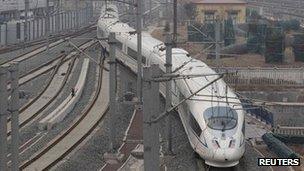China ex-rail minister given suspended death sentence
- Published
The BBC's Martin Patience: "If there is any surprise, it is that it has taken this long to get to trial"
A Chinese court has given former Railways Minister Liu Zhijun a suspended death sentence for corruption and abuse of power, state media report.
Liu was accused of accepting bribes totalling more than 64m yuan ($10m; £6m) over 25 years.
Prosecutors said he awarded government rail contracts in return for bribes.
Liu is the most high-profile official to be tried and found guilty of corruption since Xi Jinping became China's leader earlier this year.
Mr Xi has called for a crackdown on corruption, vowing to tackle it from the powerful "tigers" at the top to the "flies" at the bottom of the Communist Party.
China's railways ministry, once a powerful department, was disbanded in March.
It had been criticised for a series of safety scandals, and faced allegations of fraud which were uncovered by government audits.
'Malpractice'
Liu was convicted by a court in the capital Beijing on Monday, state-run Xinhua news agency said.
He was sentenced to death with a two-year reprieve, deprived of his political rights for life and jailed for 10 years, Xinhua said, quoting the court verdict. His personal property will also be confiscated.
Despite his sentence, he is not expected to face the death penalty - suspended death sentences are normally commuted to life imprisonment in China.
Liu was suspended from the Communist Party last May, following allegations that he embezzled funds and received bribes when handing out contracts for China's high-speed rail project.

China's high-speed railway network has expanded rapidly in recent years
During the trial, prosecutors argued that he had helped 11 people win contracts and promotions in return for bribes.
The indictment reportedly said that Liu's "malpractice" led to "huge losses of public assets and damage to the interests of the state and people".
Liu began his tenure as railways minister in 2003 and led a multi-billion dollar investment programme expanding the rail network.
China's high-speed railway network, said to be the largest in the world, has been plagued with safety scandals involving a series of accidents.
A deadly crash in Wenzhou city in July 2011 killed 40 people and caused a national outcry.
At least two government audits - one released in 2010 and another in 2013 - showed evidence of fraud and irregular accounting in the handling of government funds.
In March, China dissolved the railways ministry in a raft of measures aimed at boosting government efficiency and tackling corruption, placing its functions under the transport ministry.
Liu is the most high-profile official to be tried and found guilty of corruption since Xi Jinping became China's president in March.
But a host of other relatively senior officials, both at a central and provincial level, have also found themselves under investigation.
In May, China announced that it was investigating Liu Tienan, formerly the top official at the body responsible for planning China's economy, for "serious disciplinary violations".
Allegations against Mr Liu first surfaced in December, after an investigative journalist alleged that he made questionable financial deals, fabricated his academic record and threatened to kill a former mistress.
Last month, Lei Zhengfu, a former official at the centre of a sex tape extortion scandal, was jailed for accepting bribes.
And earlier this month, state media announced that a high-level provincial official in Inner Mongolia was also under investigation for "serious disciplinary violations" - which is often code for corruption.
'Light sentence?'
News of the former rail minister's verdict generated extensive discussion on China's microblogs, with many users scathing about what they saw as a relatively light sentence.
"How long do you think it'll be before he's out again?" user Clockwork Monkey wrote on Sina Weibo, a Twitter-like website in China.
"Liu Zhijun wasn't sentenced to death, because if he was, a whole batch [of officials] would have to die," user 2011 Varyag wrote. "Chinese law is a freak!"
Many users on Sina Weibo mocked a Xinhua report that described Liu's sentence as "a demonstration that everyone is equal before the law" and that "both the 'tigers' and 'flies' are being tackled".
"The 'tigers' can't be killed, and the 'flies' can't be eliminated," user Hu Shengjie Scarf wrote.
"If Liu Zhijun was a regular railway employee, rather than the former railways minister, would his life really have been spared?" user Concerned about the World's Wellbeing wrote.
However, there were a few voices in support of Liu's verdict.
A user going by the name of The Unsilent Majority wrote: "A suspended death sentence is still considered a light sentence? What on earth has Liu Zhijun done that deserves a certain death penalty? ... Our bosses today are not so weak or silly as to let public opinion pressurise the judicial system."
- Published8 July 2013
- Published10 June 2013
- Published10 April 2013
- Published28 May 2012
- Published19 March 2012
- Published14 March 2012
- Published28 December 2011